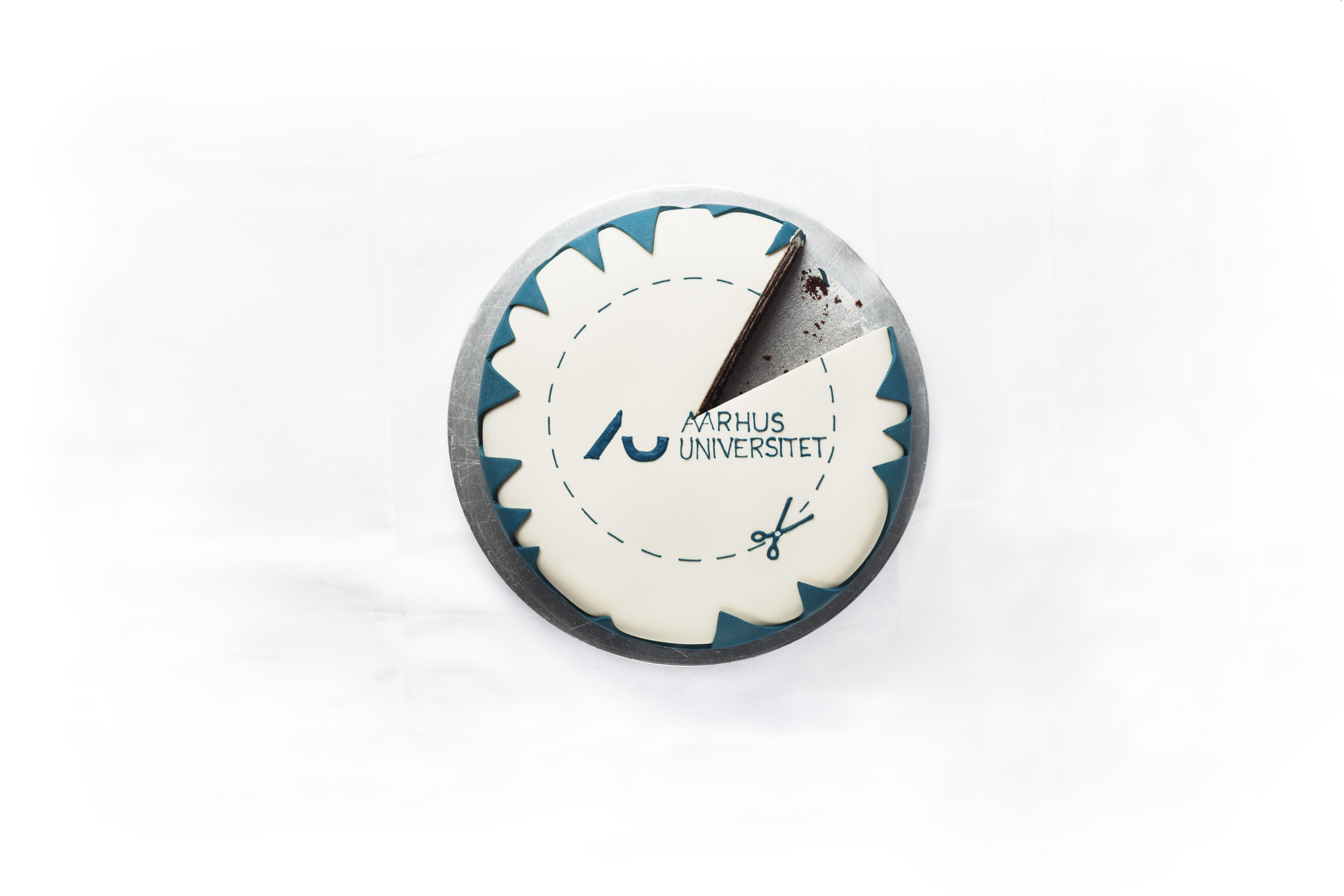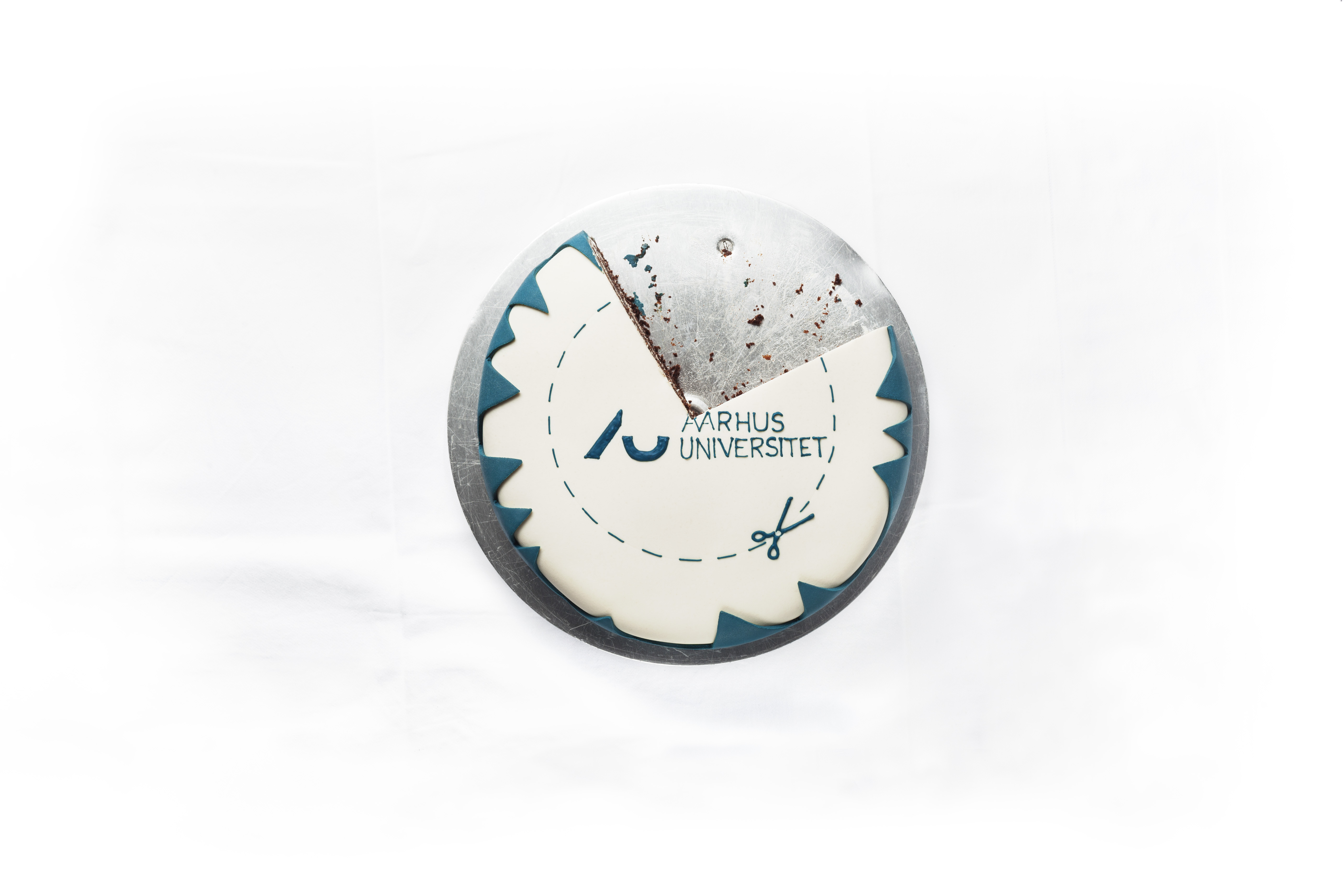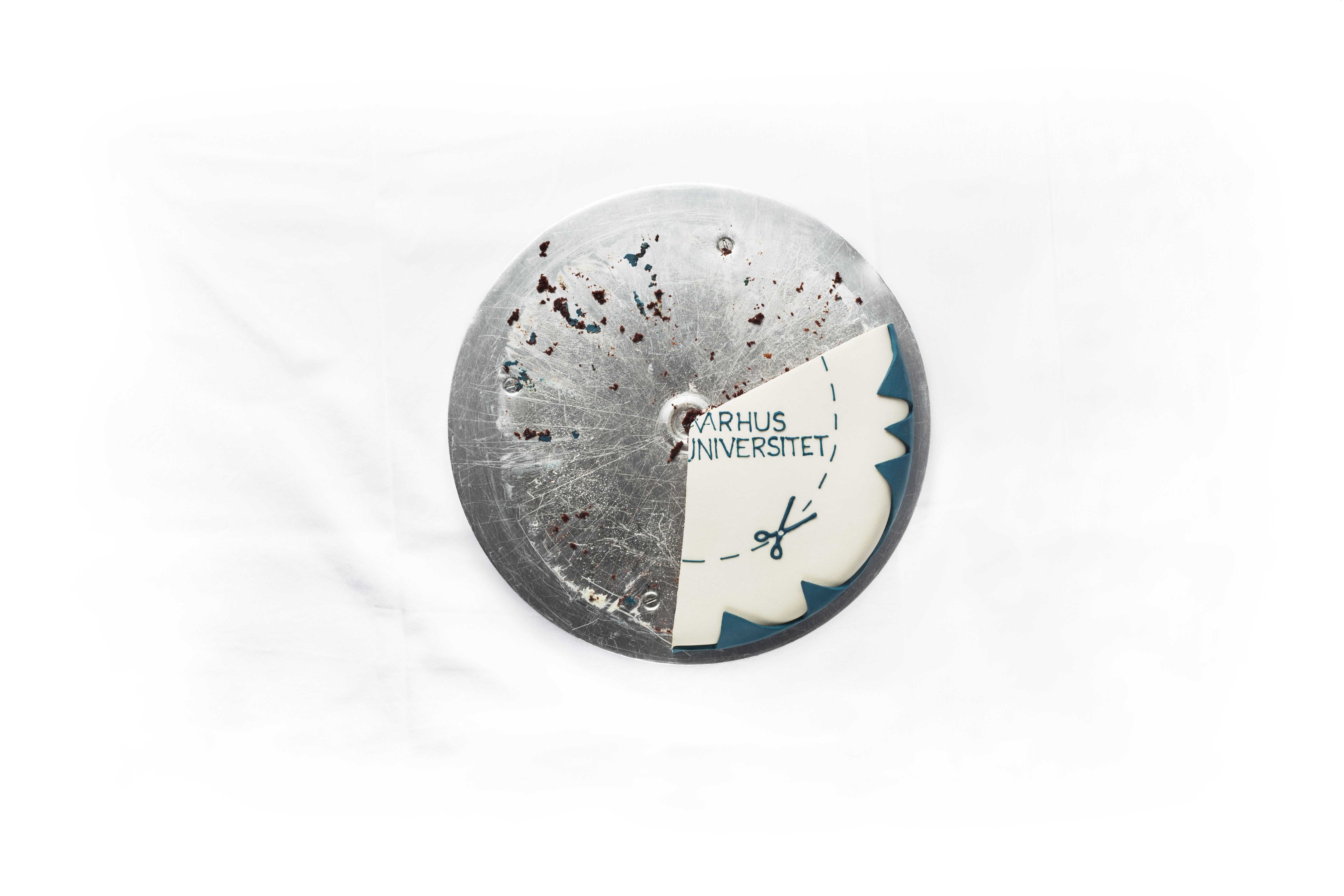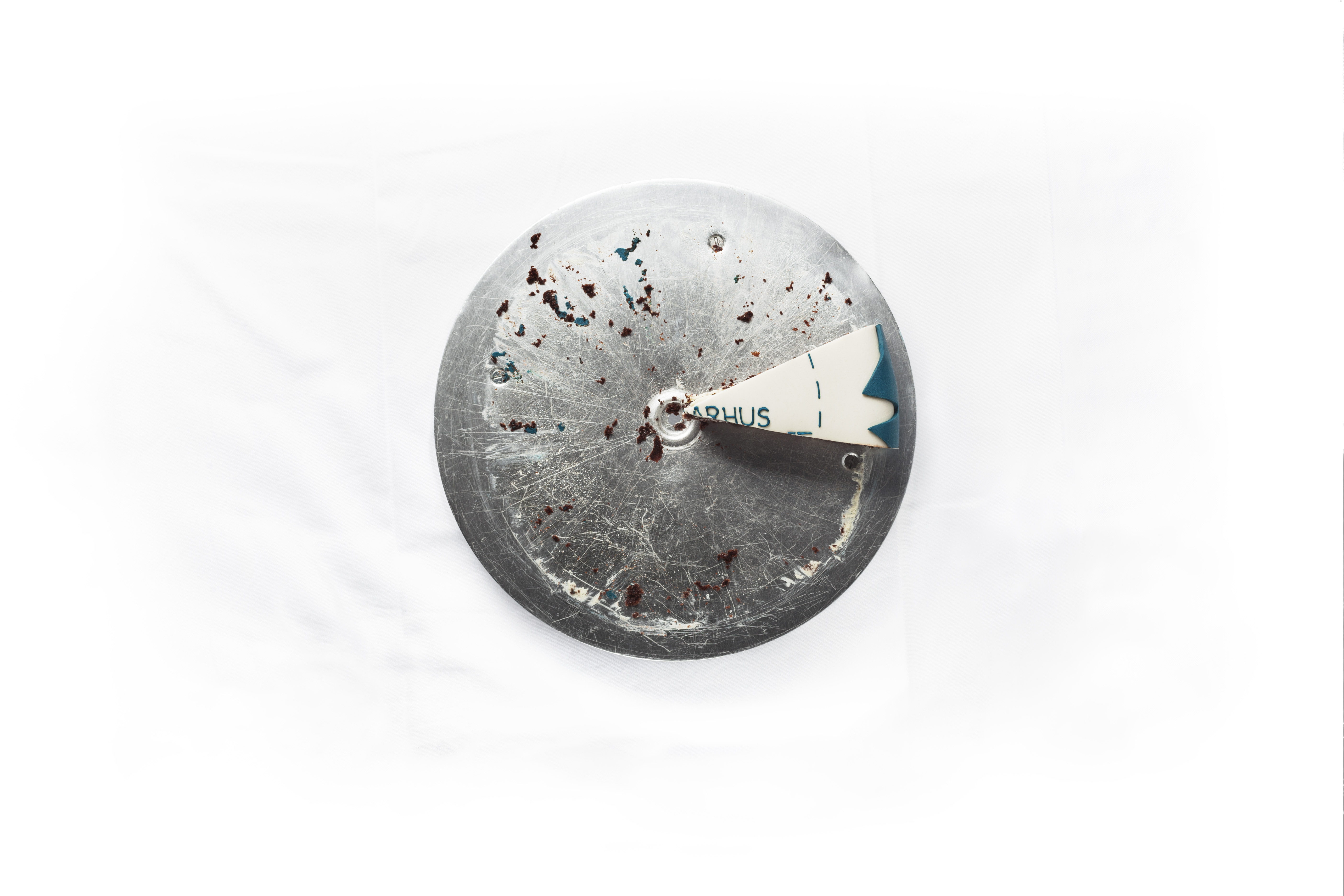Cuts in the budget and cutting the cake
A bitter-sweet coffee break with Omnibus. In January the deputy directors and departments were informed of exactly how much money they needed to save, and AU staff are now waiting with bated breath until the end of February, when they will learn who is going to be made redundant. Omnibus dropped in for coffee at three sections of AU to find out how the staff feel about their immediate future.









Six members of staff are staring at a cake on the table in front of them in what they call their “coffee corner” at the Section for Climate and Water at the Department of Agroecology in Foulum.
They take a closer look.
“Hmm, there’s a pair of scissors…”
“And there’s grass growing up the edges – it looks as if it needs cutting.”
“And that’s probably what’s just about to happen…”
“Yes, I’m worried about the cuts those scissors are going to make.”
Once they all have a piece of cake on their plates, the conversation quickly turns to the elephant in the room: these redundancies are going to be much more serious than they expected.
10-15 job losses
Professor Jørgen Eivind Olesen, the section manager, announced at a meeting earlier the same day that 10-15 employees out of a total of 164 salaried academic and technical/administrative staff were going to lose their jobs. The staff of the Department of Agroecology work in Foulum and Flakkebjerg, and at research stations in Askov and Jyndevad.
One or two
“I think there were 14 of us in the room, and I worked out that at least one or two of us would be fired at the end of February. That’s just such an awful thought because we’ve all been here for ages,” says technical manager Mette Greve.
The people round the table have been working here for anything between 20 and 29 years.
“So of course we can’t get the thought out of our minds because we’ve all been living here for so many years. Our families have put down roots here, so it will be a real wrench if we have to move,” says Rene Larsen, who is a member of the technical/administrative staff. He knows that the jobs don’t hang on trees in this particular corner of Denmark.
Six rounds of cuts
“We’ve been through six rounds of cuts in just over ten years,” says department secretary Jytte Christensen.
“A lot of our funding comes from external sources, so when the Ministry of Food, Agriculture and Fisheries stopped some of their annual research programmes, it meant that the pool of funding shrank fast. Lots of people lost their jobs in that connection,” says senior researcher Uffe Jørgensen.
The last time there were major redundancies at the department in Foulum is three years ago: 20-25 employees lost their jobs, mostly because of reductions in external funding.
Successful fundraising
Since then the financial situation has recovered thanks to applications submitted to the Strategic Research Council.
“We’ve had great success in attracting funding from research councils,” says Jørgensen.
“And funding from the EU for major projects”, adds Larsen.
External funding at the Department of Agroecology increased by ten per cent between 2012 and 2013.
A sense of injustice
Everyone seems to enjoy having a piece of cake, but a sense of injustice spreads round the room when they start talking about redundancies because the department is doing so well at the moment.
“At the meeting we were told that all the departments had to save the same amount – no matter whether they were making a profit or a loss,” says senior researcher Poul Erik Lærke.
“The previous redundancies have been the result of bleak budget forecasts, so on those occasions it made sense to fire people,” says senior researcher Kirsten Schelde. She adds:
“The situation now is that the management further up the system believe that the outlook is poor – so the same number of people are going to be fired across the board no matter whether we’re doing well or badly. This time the redundancies seem more unfair than the previous times.”
The threat of stress
The sense of injustice also arises because the department’s successful fundraising comes with a price tag attached: stress is an increasing problem for many of the staff at the department.
“I went to a meeting about how to handle stress – it was held to follow up on the workplace assessment, but we had to take a break because of the transmission (Brian Bech Nielsen’s announcement of the cuts in November last year, ed.) We went back to the meeting and had some really good discussions about stress and how to tackle it. My concern now is that this work will now be put on hold,” says Jørgensen.
“Stress is a very real threat for us, and I fear that the next thing to happen is that the people who aren’t fired simply collapse. Each time I’ve witnessed a round of redundancies, the working environment has suffered as a result,” concludes Greve.
You got the piece with the scissors on it!
At AU HR on Jens Baggesensvej, just a stone’s throw away from the University Park in Aarhus, the cake gives rise to a number of humorous comments. Alev Gencay Abde, a personnel legal consultant at AU HR, Employment Law, cuts a couple of pieces of cake and hands the plates to Jacob Søndergaard Jensen (a development consultant at AU HR, Organisational Development and Working Environment) and Jannie Sommer Mikkelsen (an HR assistant at AU HR, Competency Development).
“You got the piece with the scissors on it,” says Mikkelsen, looking at the piece on Jensen’s plate. Abde and Jensen both studied at AU and have also worked at AU ever since graduating five years ago.
More cuts in the pipeline?
Mikkelsen has only been working at AU for 18 months – before which she used to work for Vestas. “I was appointed back in the golden days, but then we were hit by the first round of redundancies. I think I finally lost my job in the seventh round. Of course a situation like this gives rise to many different emotions. But that’s what the labour market is like these days,” she says.
“We’ve also discussed the idea that although this is budget 14, what about budget 15? Will we be facing the same situation next Christmas? And what about 2016?” asks Abde.
A meeting with Louise Gade
On this particular morning at the end of January, the 130 staff at AU HR have still not been told how many people will lose their jobs as a result of the cuts. But a few days ago there was a joint meeting at which deputy director Louise Gade announced that HR had to make cuts of DKK 6.1 million out of a total budget of DKK 86.3 million.
“Nobody felt like asking any questions, so it was a very quiet meeting. Since then we’ve held meetings in our own units, where it’s a bit easier to talk about what’s happening. Most people thought that DKK 6.1 million seemed like an awful lot of money. Some cuts are inevitable of course. The only question is who’s going to be affected and where? It’s going to be hard to make such big cuts without getting rid of some people,” says Abde.
Salaries at AU HR amount to DKK 61.6 million out of a total budget of DKK 86.3 million.
What’s going to happen?
“After the meeting we talked about how it was going to be done. Will they send emails or call people on the phone? Or will people be called into the boss’s office?” asks Jensen.
“We’re trying to look on the bright side,” says Mikkelsen, who shares an office with two other HR supporters.
“That’s just a defence mechanism, of course, because we can’t help thinking about it. After all, hiring and firing people is what we do. And we’re all very busy trying to keep on top of it,” she continues. Her job is to support the HR consultants who are training AU managers to cope with the job of firing people.
A dual role
Abde nods. “We talk about it in our coffee breaks, too. But we work for HR, so we have a dual role because our job is to support the entire process. And it’s hard to an employee at the same time. So I agree that the question asked at the meeting was a really good one.”
“Someone asked who would handle cases in which our colleagues in HR had to be fired,” says Jensen, explaining that it would be extremely tricky for a member of the HR staff to be involved in firing their own colleagues.
He continues: “The answer is that the management will have to do it.”
Coffee on the sixth floor
Jakob Bek-Thomsen, an assistant professor of the history of ideas at the Department of Culture and Society, takes a keen look at the cake box standing on his desk on the sixth floor in the Nobel Park in Aarhus.
“We’ll get the coffee while we wait for the other two, but we’ll have to go down to the fourth floor because our coffee machine up here is broken,” he says. Stefan Gaarsmand Jacobsen, a post.doc. studying the history of ideas, and Carsten Fogh Nielsen, a post.doc. studying philosophy, have also been invited for coffee.
Shrouded in uncertainty
Last week staff were informed of how deep the cuts at the Department of Culture and Society were going to be.
“Our head of department told us that we would have to make cuts amounting to DKK 6 million. But he couldn’t tell us much more because even though they had a reasonably clear budget they’d discovered problems when analysing the individual items in it. For instance, they’d found three members of the technical/administrative staff who shouldn’t have been included in our budget at all. On the other hand, there might be other areas of AU that are paying for people who should really be included in our budget,” says Nielsen. He continues:
“This also means that our management still can’t say how much we have to save. We were given a few rough figures, but they were still shrouded in uncertainty. And I guess this is typical of the Faculty of Arts: we’re not very good at drawing up budgets – let alone accounts!”
Prospects look bleak
In one sense none of the three are going to be affected directly by the redundancies that lie ahead, because they’re all employed in temporary positions linked to externally funded research projects. But in another sense they will all be affected, because they now take a bleak view of their short-term and long-term prospects of ever gaining tenure at AU.
“We don’t have a dagger at our throats at the moment. But the situation does affect us because we’d prefer a bit more continuity – not only for our own sakes, but also for our students and colleagues,” says Jacobsen.
Get out as fast as you can
“Some people who know more than I do about what’s going on have actually advised me to get out as fast as I can because the future looks so hopeless.”
And he continues:
“I must say I expected a bit more of the academic development process. The feeling was that opportunities would come your way if you worked hard; because even though there was an awful lot of hot air in the wind, there were also plenty of good things going on at AU. Perhaps even the opportunity to be involved in developing teaching initiatives in the long term.”
Things are different now
Since then the sense of optimism has faded.
“Things are completely different today. The management are trying to persuade us that they’re interested in development at the university, but I think that everyone involved in taking even small decisions in relation to a budget is under major pressure at the moment. And I’m not sure when it will end. We’re going to have to make some major cuts – but will things settle down afterwards? Or are there just more cuts ahead? These are the kind of questions that put a completely different perspective on the future.”
The difference is the management
Bek-Thomsen sees the situation a little differently:
“I’ve always assumed that a career here would require external funding, so the planned cuts aren’t a big surprise in that sense. I think the big difference lies in the way we perceive the management – and the administration – at the university after the changes. Our top priority as researchers is to provide the best possible research and teaching. So it’s very difficult to understand that other parts of the university have different priorities.”
Grassroots staff paying the price
Bek-Thomsen believes that the way the total cuts of DKK 225 million are being distributed says it all.
“The huge deficit has been created by the management’s administrative costs in connection with the academic development process. But the price is going to be paid by the grassroots staff who work at our departments.”
“We’re given the impression that they’re making cuts in our core business areas, but without good teaching there will be no university at all – at least not at the Faculty of Arts,” says Jacobsen.
Nielsen adds:
“We know there are going to be cuts in the administration, but we haven’t heard any details yet so it’s easy to get the impression that nothing’s going to happen in that area. That’s the kind of thing you hear at the coffee machine, anyway. ”
How has it come to this?
There is much criticism of the senior management team.
“People ask ‘How the hell has it come to this? Unforeseen cuts of DKK 225 million!’ And the answer is prompt: ‘It’s the management’s fault’. And when people say ‘the management’, they mean the management above departmental level,” says Nielsen.
When he returns to his office after the coffee break, he stops to read a notice hanging on the kitchen door.
At the top it says “After a meeting with the Faculty Liaison Committee on 8 January, the Faculty Management has decided that the cuts should be distributed as follows in 2014.” Then it announces that the various departments at the Faculty of Arts are going to have to save anything between DKK 0.1 million and DKK 6 million. Someone has put a red ring around the words “Dean’s Office: 0.1 million”.
Translated by Nicholas Wrigley

